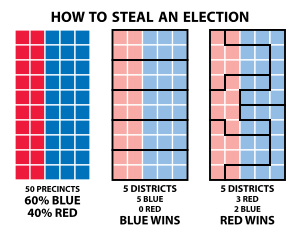Gerrymandering: How a Minority of the Votes can Win ALL the Power
Gerrymandering: How a Minority of the Votes can Win ALL the Power
In a recent Telegraph poll about gerrymandering, some answers revealed that not everyone knows what the term gerrymandering means. If you have any doubts, read on.
You will have noticed that electoral district (riding) boundaries are adjusted periodically. It is possible to adjust electoral district boundaries in such a way as to ensure that a particular party’s supporters can “win” more Members of Parliament (MPs) than their numbers would suggest is fair. To see how that happens, please study the illustration above. Gerrymandering is the deliberate adjustment of electoral district boundaries to favour a certain party — the party in power. Gerrymandering can move a party from a minority position to a strong majority — with the same number of votes.
The Rossland Telegraph does not know that deliberate gerrymandering resulted in the last election’s results — that is, a majority of the MPs in the House of Commons, from only 39% of the popular vote — but whether or not it was deliberate, the distribution of votes for the parties among the electoral districts gave the type of results that gerrymandering aims to achieve.
What triggers boundary adjustments?
The federal Electoral Boundaries Readjustment Act requires the Governor in Council to establish an Electoral Boundaries Commission in each province after each census provides new information on population growth and movement in Canada. In our previous federal election, there were 308 ridings; for the upcoming federal election in October, there are 338 ridings. The ten Electoral Boundaries Commissions study the population figures (among other things) for their respective provinces and eventually submit a report with new boundaries for the ridings.
Who is on those commissions?
Each commission consists of three members: a chairperson and two other members. The chairperson is chosen by the Chief Justice in each province, and the other two members of each commission are appointed by the Speaker of the House of Commons. The current Speaker is Andrew Scheer, a Conservative MP. Speakers are elected by the House of Commons by secret ballot from among all MPs who do not withdraw their names, and are usually MPs for the governing party.
If there is any bias in the appointment of Electoral Boundaries Commission members, it seems reasonable to think that the bias would favour the governing party. Whether or not ridings are gerrymandered to favour the party in power may depend on the interpretation of terms that describe things the commissions are required to consider: “community of interest or community of identity in or the historical pattern” of a riding. Those terms are not defined in the definition section of the Act, and are used to mean various things in different contexts. If the “historical pattern” includes the voting history of an area, then it seems that gerrymandering may be an accepted practice under the legislation.
What does gerrymandering mean for voters?
It means that every voter should get educated about the issues, and where the parties stand on them, and VOTE. Failure to vote has the same effect as voting for the outcome you least favour. Of course, that’s the case whether or not our ridings have been gerrymandered.
See what your candidates say:
Read the Rossland Telegraph series of questions for, and answers from, our candidates in this riding. The Liberal and NDP candidates have answered the first set of five questions; two more sets of questions will be published in coming weeks. The Conservative candidate is unfortunately “unable” to answer the questions.

























